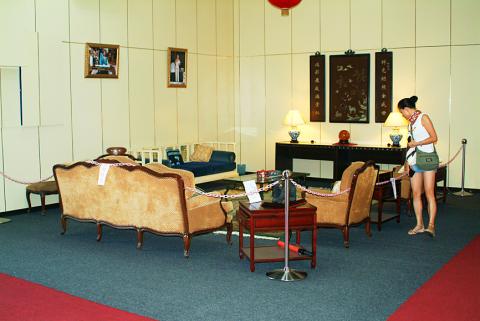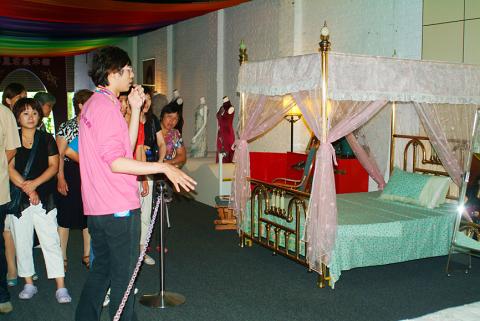Arriving at the first ever museum dedicated to Teresa Teng (鄧麗君),
the 20th century’s best-known Mando-pop singer, I couldn’t help but feel surprised.
It’s not located in central Kaohsiung City or even a business, commercial or artsy district as one might expect, but amid a group of warehouses along a section of Kaohsiung’s Love River with few shops or other businesses.

Photo Courtesy of Today Color
The only thing that sets the building apart from the other warehouses is its white walls — and the row of tour buses parked outside.
Perhaps even more surprising is just how far most of the museum’s visitors have come to see it. Since The Teresa Teng Memorial Hall (鄧麗君紀念文物館) opened in April this year — 15 years after the singer’s death from an asthma attack in 1995 while on vacation in Thailand at the age of 42 — it has seen 600 to 700 visitors a day. More than 90 percent of them come from China, according to Teng’s eldest brother, Teng Chang-an (鄧長安), who set up the site.
Huang Yan (黃燕), a 39-year-old tour guide from Shanghai, said she never tires of listening to Teng’s songs or watching her videos, even though she hears them repeatedly on the tour buses.

Photo Courtesy of Today Color
She remembers a time in China when Chinese Communist Party officials told people not to listen to Teng’s songs because she was from Taiwan, the “renegade province.”
“But in the early 1980s, we secretly listened at home. Even though they banned her songs, there were people who would secretly listen,” Huang said. “As far as I know, no one actually got in trouble for it. The officials also liked her songs. It was just politics, because she was from Taiwan. They said her lyrics would have a negative influence, but that was all nonsense.”
On a recent visit, tourists of all ages streamed into the museum with excited looks on their faces — seemingly oblivious to the strange warehouse setting — as they were led into a room where they intently watched a video about Teng’s early years.
Her father was a military man, and after the Kuomintang (KMT) lost the civil war to the Communists, he moved to Taiwan. His daughter showed talent for singing from a young age, charming families in the military village where she grew up. Her father, recognizing her potential, agreed to let her drop out of high school and pursue a career as a professional singer.
The walls of the 250-ping (825m2) museum are decorated with pictures, large and small, of Teng. A wide assortment of items from Teng’s personal life are on display, ranging from a Mercedes Benz she bought in 1994, a year before her fatal asthma attack, to large glass cases of her on-stage jewelry, mannequins dressed in her glamorous dresses, and even a mahjong table.
“Teresa Teng’s mother loved to play mahjong. Despite her busy schedule, Teng still found time to play mahjong with her mother,” the tour guide said.
The last stop is the souvenir shop — oddly, the only place in the museum where visitors can hear Teng’s music. A large TV continuously plays DVDs of her performances. There’s even a shimmering disco ball. With her most famous and popular songs playing — including Small Town Stories and The Moon Represents My Heart — it’s easy for fans to linger.
And that’s exactly what a small group of Chinese tourists did: They watched the DVD quietly, paying no attention to the gift items or their fellow tourists.
A tourist from Xi’an, China said there was only one way to explain why she loves Teng’s songs: “They’re beautiful.”
“I first heard her songs in the early 1980s when I was in my 20s. I was just starting to work. I thought her songs sounded great, her voice was so gentle and beautiful. I’ve liked her ever since then. Her voice is very unique,” Xu Min (徐敏) said.
She added: “I feel so touched being here. In the 1980s, even though we knew she was from Taiwan, we thought she was one of us, like a family member.”
Another tourist said Teng’s songs cheer people up.
“Her songs make me feel light-hearted, even now. They make me feel better,” said Li Cong (李琮), 40. “When we go to karaoke bars, we often sing her songs.”
Teng was the first person of Chinese descent to perform at the Lincoln Center and the first Asian woman to perform at Caesar’s Palace in Las Vegas, but her brother believes that it is the working class, people with hard lives, who appreciated her songs the most.
“They were often played in work places, easing the pressures of work,” Teng Chang-an said.
Her songs were of particular import to those living in China. “They had just come out of the Cultural Revolution, listening to revolutionary songs,” he said. “Her songs were like a breakthrough for them.”
“Some government agencies and private entrepreneurs wanted to open a memorial hall for the performer, but ... we didn’t want it to be commercialized. So we decided to open the memorial hall with our own funds,” Teng Chang-an said. “We’re not so concerned about making a profit. This is to fulfill her dream of contributing to society.”
He admitted the museum is not adequate and said he hopes to do better.
“I hope to raise enough money in three years to build a permanent memorial hall so that her spirit and songs can be passed down to future generations,” he said.

April 14 to April 20 In March 1947, Sising Katadrepan urged the government to drop the “high mountain people” (高山族) designation for Indigenous Taiwanese and refer to them as “Taiwan people” (台灣族). He considered the term derogatory, arguing that it made them sound like animals. The Taiwan Provincial Government agreed to stop using the term, stating that Indigenous Taiwanese suffered all sorts of discrimination and oppression under the Japanese and were forced to live in the mountains as outsiders to society. Now, under the new regime, they would be seen as equals, thus they should be henceforth

Last week, the the National Immigration Agency (NIA) told the legislature that more than 10,000 naturalized Taiwanese citizens from the People’s Republic of China (PRC) risked having their citizenship revoked if they failed to provide proof that they had renounced their Chinese household registration within the next three months. Renunciation is required under the Act Governing Relations Between the People of the Taiwan Area and the Mainland Area (臺灣地區與大陸地區人民關係條例), as amended in 2004, though it was only a legal requirement after 2000. Prior to that, it had been only an administrative requirement since the Nationality Act (國籍法) was established in

With over 80 works on display, this is Louise Bourgeois’ first solo show in Taiwan. Visitors are invited to traverse her world of love and hate, vengeance and acceptance, trauma and reconciliation. Dominating the entrance, the nine-foot-tall Crouching Spider (2003) greets visitors. The creature looms behind the glass facade, symbolic protector and gatekeeper to the intimate journey ahead. Bourgeois, best known for her giant spider sculptures, is one of the most influential artist of the twentieth century. Blending vulnerability and defiance through themes of sexuality, trauma and identity, her work reshaped the landscape of contemporary art with fearless honesty. “People are influenced by

The remains of this Japanese-era trail designed to protect the camphor industry make for a scenic day-hike, a fascinating overnight hike or a challenging multi-day adventure Maolin District (茂林) in Kaohsiung is well known for beautiful roadside scenery, waterfalls, the annual butterfly migration and indigenous culture. A lesser known but worthwhile destination here lies along the very top of the valley: the Liugui Security Path (六龜警備道). This relic of the Japanese era once isolated the Maolin valley from the outside world but now serves to draw tourists in. The path originally ran for about 50km, but not all of this trail is still easily walkable. The nicest section for a simple day hike is the heavily trafficked southern section above Maolin and Wanshan (萬山) villages. Remains of